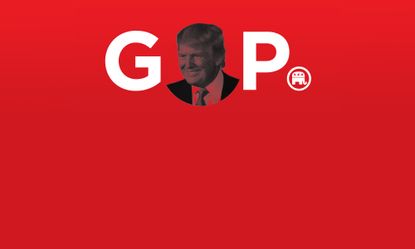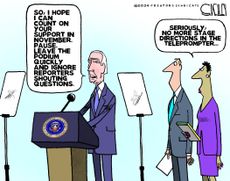The Republican Party now belongs to Donald Trump
Trump's GOP is a mix of Chris Christie and Jeff Sessions, with a dash of coal country thrown in


When Donald Trump became the GOP's presumptive presidential nominee, he successfully reversed the ruling order of the Republican Party. Those who were last are now first. And for the first time in decades, someone had united the non-conservative factions of the Republican Party.
Is it any wonder Republicans seem disoriented?
The conservative movement, whose ideas long dominated the Republican Party, had its natural base in the anti-New Deal middle West and the individualist far West. Theirs was a synthesis of Robert Taft's conservatism and Barry Goldwater's austere individualism. Eventually, this movement assimilated to itself the churched evangelicals, Catholics, and Mormons of the Moral Majority, along with hawkish neoconservative intellectuals. Naturally, this coalition was on the side of business owners ("You didn't build that"), free trade, and unrestricted immigration. It was hawkish and moralizing, and its intellectuals had a preoccupation with sound doctrine. They talked about capital-P Principles. These were the conservatives who came to dominate the party after the Reagan and Gingrich revolutions.
Subscribe to The Week
Escape your echo chamber. Get the facts behind the news, plus analysis from multiple perspectives.

Sign up for The Week's Free Newsletters
From our morning news briefing to a weekly Good News Newsletter, get the best of The Week delivered directly to your inbox.
From our morning news briefing to a weekly Good News Newsletter, get the best of The Week delivered directly to your inbox.
But now, at the moment of that coalition's strenuous exhaustion, Donald Trump has built a new coalition that draws from everyone else in the Republican fold. And he won.
Trump drew in the secular and moderate Northeast Republicans who had been sidelined by the conservatives. He combined those with the populist, nationalist South, particularly unchurched evangelicals. He threw in the downwardly mobile parts of Appalachia as well. The Trump coalition is a mix of Chris Christie and Jeff Sessions, with a dash of coal country thrown in.
This coalition is protectionist and talks about "jobs," not entrepreneurs. It is skeptical of wars, but willing to be merciless when necessary. Its would-be edgy intellectuals are particularists who care more about style than doctrine. They talk about forces. This coalition combines and amplifies traditional Mugwump and Dixie objections to mass immigration.
That Trump accomplished this is astonishing. Trump lacks principle, knowledge, and political judgment. (Just imagine the face he would make if someone explained to him that he was reviving the Mugwump tradition in Republican politics.) On issues where he has little knowledge or experience, he has an unusual ability to run ahead of public opinion. For the die-hard Trump supporters, Trump's march to victory over more conventional Republicans has boosted their morale. Trump rallies are weird carnivals. Their lead performer is loose.
Trump is now asking traditional conservatives to get on board and be as obedient to their new leaders as the followers were to them. You could say they are falling in line. Even the candidates who attacked him most vociferously, Marco Rubio and Rick Perry, seem to be signing up for a ride on the Trump Train. But many conservative stalwarts are making this transition with deliberate slowness. It is as if they want observers to view them less as accomplices than as hostages. Good luck with that.
Paul Ryan was "just not ready" to endorse Trump earlier this month, but seems to be trending in that direction. Trump called Lindsey Graham last week and seems to have gotten Graham to at least be a little quieter. The GOP's fundraising apparatus is kicking into low gear and looks like it is going to stay that way. If Trump's ideological makeover of the Republican Party somehow makes the party more competitive against Democrats, the Ryans and Grahams and an entire class of conservative intellectuals and party technicians are in for a rude awakening in November.
Losing command of the party is a difficult thing to accept. And I doubt the conservative movement will accept it in time for this election. Conservatives expect Trump to lose.
My own inclination is to step aside and let Trump's campaign burn itself into cinders by November. But I also believe Hillary Clinton is fully capable of self-destructing. If Trump wins without conservatives, they may never seem useful to the party again. And if he loses, the conservative leaders who joined him may never be trusted by the many conservative institutions and donor class in the same way.
Create an account with the same email registered to your subscription to unlock access.
Sign up for Today's Best Articles in your inbox
A free daily email with the biggest news stories of the day – and the best features from TheWeek.com
Michael Brendan Dougherty is senior correspondent at TheWeek.com. He is the founder and editor of The Slurve, a newsletter about baseball. His work has appeared in The New York Times Magazine, ESPN Magazine, Slate and The American Conservative.
-
 'Horror stories of women having to carry nonviable fetuses'
'Horror stories of women having to carry nonviable fetuses'Instant Opinion Opinion, comment and editorials of the day
By Harold Maass, The Week US Published
-
 Haiti interim council, prime minister sworn in
Haiti interim council, prime minister sworn inSpeed Read Prime Minister Ariel Henry resigns amid surging gang violence
By Peter Weber, The Week US Published
-
 Today's political cartoons - April 26, 2024
Today's political cartoons - April 26, 2024Cartoons Friday's cartoons - teleprompter troubles, presidential immunity, and more
By The Week US Published
-
 Arizona court reinstates 1864 abortion ban
Arizona court reinstates 1864 abortion banSpeed Read The law makes all abortions illegal in the state except to save the mother's life
By Rafi Schwartz, The Week US Published
-
 Trump, billions richer, is selling Bibles
Trump, billions richer, is selling BiblesSpeed Read The former president is hawking a $60 "God Bless the USA Bible"
By Peter Weber, The Week US Published
-
 The debate about Biden's age and mental fitness
The debate about Biden's age and mental fitnessIn Depth Some critics argue Biden is too old to run again. Does the argument have merit?
By Grayson Quay Published
-
 How would a second Trump presidency affect Britain?
How would a second Trump presidency affect Britain?Today's Big Question Re-election of Republican frontrunner could threaten UK security, warns former head of secret service
By Harriet Marsden, The Week UK Published
-
 'Rwanda plan is less a deterrent and more a bluff'
'Rwanda plan is less a deterrent and more a bluff'Instant Opinion Opinion, comment and editorials of the day
By The Week UK Published
-
 Henry Kissinger dies aged 100: a complicated legacy?
Henry Kissinger dies aged 100: a complicated legacy?Talking Point Top US diplomat and Nobel Peace Prize winner remembered as both foreign policy genius and war criminal
By Harriet Marsden, The Week UK Last updated
-
 Trump’s rhetoric: a shift to 'straight-up Nazi talk'
Trump’s rhetoric: a shift to 'straight-up Nazi talk'Why everyone's talking about Would-be president's sinister language is backed by an incendiary policy agenda, say commentators
By The Week UK Published
-
 More covfefe: is the world ready for a second Donald Trump presidency?
More covfefe: is the world ready for a second Donald Trump presidency?Today's Big Question Republican's re-election would be a 'nightmare' scenario for Europe, Ukraine and the West
By Sorcha Bradley, The Week UK Published